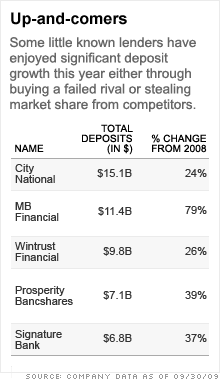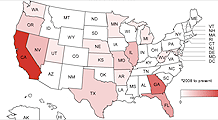Meet the new leaders of banking
JPMorgan and Wells may steal the headlines. But smaller banks like Chicago's MB Financial and L.A.'s City National are quietly rising through the ranks.
NEW YORK (CNNMoney.com) -- JPMorgan Chase, Wells Fargo and other bank behemoths have bulked up over the past year. But they're not the only ones getting bigger these days.
Dozens of small banks that were otherwise anonymous in the years leading up to the financial crisis have also enjoyed robust growth in recent months.
Some of them have expanded so rapidly, in fact, that they have transformed themselves into what some argue is the next generation of regional banking leaders.
Chicago's MB Financial (MBFI), for example, drastically widened its deposit base by buying local rivals that failed. In September, the company made its boldest purchase yet when it scooped up 11 branches and $7 billion worth of deposits controlled by Corus Bankshares after Corus was seized by the FDIC.
And with the fragmented Chicago banking landscape continuing to shift, MB Financial's buying spree may be far from over.
"We think there is quite a bit of opportunity in the area for similar transactions in the future," said Mitchell Feiger, chief executive officer of MB Financial.
Other fast-growing regional banks, such as Prosperity Bancshares (PRSP), have been buoyed by a resilient economy in their home market and diligent underwriting practices.
The Houston, Texas-based lender has not only reported consistently higher profits so far this year, but it also recently hiked its dividend and was reportedly a key contender for Guaranty Bank, a significantly larger peer that failed in late August. Guaranty was eventually acquired by Spain's BBVA.
And some banks have simply managed to harness the broader market forces at work, including consumers' flight from stocks to cash earlier this year and widespread discontent with larger banks in the wake of taxpayer bailouts.
Signature Bank (SBNY), which operates solely within the New York metropolitan area, is one of those banks. Between July and September alone, the company reported almost double-digit growth in both loans and deposits, a feat that is not lost on many industry analysts.
"That is pretty phenomenal," said Andy Stapp, a senior equity research analyst at brokerage B. Riley & Company, who tracks Signature.
Of course, much of the spoils of the recent shakeup in the banking industry have gone to the biggest players in the business.
Both JPMorgan Chase (JPM, Fortune 500) and Wells Fargo (WFC, Fortune 500) dramatically expanded their retail banking operations after they bought Washington Mutual and Wachovia respectively.
Today, the nation's 10 largest banks control approximately $3.4 trillion in deposits, according to recent FDIC data, $700 billion more than they did just a year ago.
Some would even argue that the banking field is much more crowded these days with the entry of Goldman Sachs (GS, Fortune 500), American Express and GMAC, all of whom got into the deposit-taking business last fall when they were unable to access traditional sources of liquidity.
Still, that has hardly deterred many ambitious bankers looking to expand.
Los Angeles-based City National (CYN), which caters largely to businesses as well as affluent customers, recently indicated it was looking to expand its presence in Northern California after it acquired a branch in the Silicon Valley region in late August.
"Going to San Jose was always part of our plan," said City National CEO Russell Goldsmith. "It was an attractive way to get into the third-largest city in California and complete the circle around the [San Francisco] Bay area."
Tepid loan demand has complicated growth plans for many ambitious banks, however.
With unemployment now above 10%, Americans are broadly reining in their spending. Consumers and businesses remain hesitant to seek out credit, according to the most recent survey of senior bank loan officers by the Federal Reserve.
And if forthcoming federal legislation requires banks to hold more capital, that could heighten the competition for customers.
"It will be harder for banks to grow deposits, which is one of the reasons why we are so interested to get them now," said MB Financial's Feiger.
If banks like MB Financial can navigate all those hurdles and aren't constrained by issues like commercial real estate loan losses, the opportunities to grow could be huge, notes Aaron Deer, an equity bank analyst for Sandler O'Neill.
With potentially hundreds of additional banks likely to fail in the months and years ahead, competition will continue to ease. And should credit remain tough to come by, banks will likely be able to fetch a premium even on new loans made to those borrowers with sterling credit.
"My guess is the opportunities for organic growth is probably going to accelerate over the coming year," said Deer. "Right now banks are finding very attractive lending opportunities." ![]()



